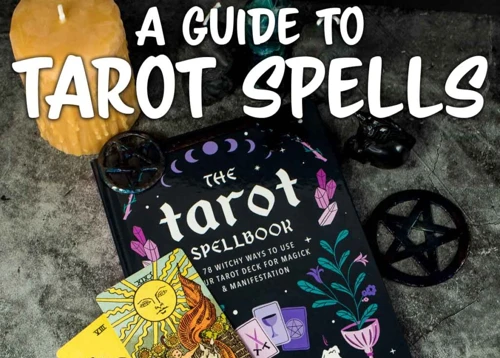The Court Cards in tarot are often enigmatic and mysterious, holding immense power and potential. Unlocking this power and harnessing their energy can greatly enhance your tarot readings. These cards represent different personality types, elements, and energies, offering insights into the people and situations in your life. By understanding and interpreting the Court Cards, connecting with their energy, and incorporating them into your readings, you can deepen your understanding and deliver more accurate and meaningful interpretations. In this article, we will explore the various ways to unlock the power of the Court Cards step-by-step, allowing you to tap into their rich symbolism and unlock their hidden potential. Get ready to discover a new dimension in your tarot practice as we delve into the remarkable world of the Court Cards.
Contents
- Understanding the Court Cards
- Interpreting the Court Cards
- Connecting with the Court Cards
- Working with the Court Cards in Tarot Readings
- Combining Court Cards with Other Cards
- Conclusion
-
Frequently Asked Questions
- What do the Court Cards represent in tarot?
- How many ranks are there in the Court Cards?
- What do the different ranks of Court Cards correspond to?
- Do the Court Cards reflect characteristics and behaviors of individuals?
- How can the Court Cards be used as signifiers in tarot readings?
- Are there specific personality traits associated with each Court Card?
- Can the Court Cards provide insights into relationships?
- Why is it important to study and explore the Court Cards?
- How can understanding the Court Cards enhance tarot readings?
- What role do the Court Cards play in tarot readings?
- References
Understanding the Court Cards
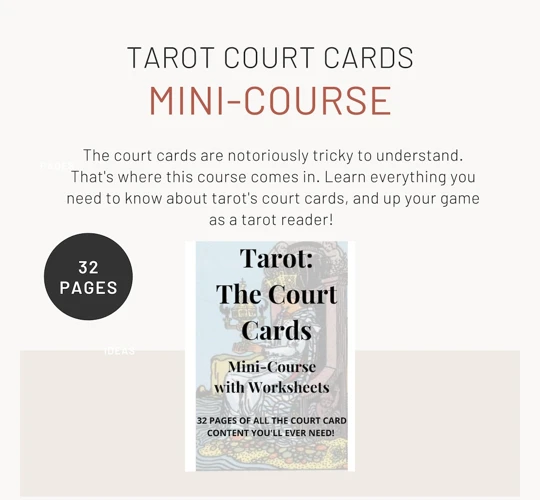
– The Court Cards in tarot represent different personalities, archetypes, and energies that can manifest in our lives.
– These cards typically depict four different ranks: Pages, Knights, Queens, and Kings.
– Each rank corresponds to a specific element: Pages represent Earth, Knights represent Air, Queens represent Water, and Kings represent Fire (learn more about the elements and Court Cards).
– The Court Cards can be seen as a reflection of ourselves and the people around us, offering insights into their characteristics, behaviors, and motivations.
– They can also serve as signifiers in readings, providing specific information about the individuals involved or the energy at play.
– To truly understand the Court Cards, it is important to delve deeper into their personality traits (discover more about the personality traits of Court Cards).
– Being able to identify these traits and connect them to the individuals or situations in question can greatly enhance the accuracy and depth of a tarot reading.
– The Court Cards can also offer valuable insights into relationships and dynamics, shedding light on the connections and interactions between people.
– Study and exploration of the Court Cards is essential for any tarot reader looking to unlock their full potential and harness their energy effectively.
– Ultimately, understanding the Court Cards is a key step towards mastering their symbolism and integrating them seamlessly into your tarot readings.
What are the Court Cards?
– The Court Cards in tarot are a distinct group of cards that make up one-fourth of the tarot deck.
– They are often referred to as the “royal family” of the tarot, representing different personalities, roles, and energies.
– The Court Cards consist of the Pages, Knights, Queens, and Kings, each representing a specific rank and element.
– The Pages are associated with the element of Earth and symbolize youth, growth, and learning.
– The Knights are connected to the element of Air and symbolize action, movement, and drive.
– The Queens correspond to the element of Water and represent intuition, emotions, and nurturing qualities.
– The Kings are aligned with the element of Fire and embody leadership, authority, and passion.
– The Court Cards can be seen as archetypes or personas that exist within us or represent the people we encounter in our lives.
– They offer a deeper understanding of the various personalities and energies that influence our experiences.
– Each Court Card holds its own unique characteristics, strengths, and weaknesses, which can be explored further in a comprehensive Court Card tarot guide.
– By recognizing and interpreting the Court Cards in a reading, we can gain valuable insights into the individuals involved or the energy that is influencing a situation.
The Elements and Court Cards
The Court Cards in tarot are closely associated with the elements, which provide additional layers of meaning and symbolism to their interpretations. Each rank of Court Cards is connected to a specific element, further influencing their characteristics and energy:
– The Pages are associated with the element of Earth. They embody practicality, groundedness, and a nurturing nature. Pages represent the energy of manifestation and growth. They are often seen as messengers or students, eager to learn and explore.
– The Knights correspond to the element of Air. They are known for their intellect, communication skills, and a quest for knowledge. Knights embody the energy of action, movement, and change. They are often portrayed as warriors or travelers, always striving for new experiences.
– The Queens are linked to the element of Water. They represent emotions, intuition, and empathy. Queens embody the energy of nurturing, compassion, and understanding. They are often depicted as wise and serene figures, offering support and guidance.
– The Kings are aligned with the element of Fire. They symbolize passion, ambition, and leadership. Kings embody the energy of creativity, power, and authority. They are often portrayed as strong and charismatic rulers, capable of making bold decisions.
Understanding the elemental associations of the Court Cards can provide valuable insights into their characteristics, motivations, and behaviors. It allows tarot readers to tap into the elemental energy present in a reading and provide more nuanced interpretations. Whether you are interpreting a Page, Knight, Queen, or King, their corresponding element adds depth and richness to their symbolism, enabling a deeper understanding of the Court Cards in tarot readings.
Interpreting the Court Cards
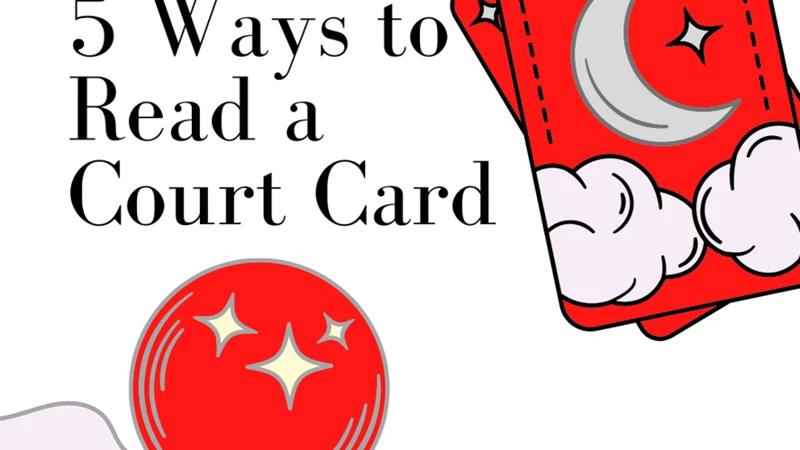
– Interpreting the Court Cards in tarot readings requires a keen understanding of their unique role and significance.
– One approach to interpreting Court Cards is to recognize and interpret their personality traits (learn more about Court Cards’ personality traits).
– Each Court Card embodies distinct characteristics and qualities that can provide valuable insights into the individual or energy being represented.
– For example, the Queen of Cups embodies emotional sensitivity, intuition, and nurturing qualities, while the King of Swords symbolizes intellect, logic, and assertiveness.
– By considering these traits and relating them to the context of the reading, you can gain deeper insights into the motivations, behaviors, and potential outcomes involved.
– Another way to interpret Court Cards is to use them as signifiers or representatives of specific individuals or energies in a reading.
– In this approach, the Court Cards can serve as focal points, offering specific information and guidance about the people or energy influencing the situation.
– For example, the Page of Pentacles may represent a young and enthusiastic individual, while the Queen of Wands may signify a charismatic and confident person.
– Understanding the relationships between Court Cards in a spread is also important for interpretation.
– The placement, proximity, and interactions of Court Cards with other cards can indicate the dynamics and connections between people or energies in a situation.
– For instance, a Page of Swords next to the Emperor may suggest a rebellious and outspoken child challenging the authority figure.
– Interpreting Court Cards requires intuition, observation, and a deep understanding of the tarot system to reveal their true meanings and messages in a reading.
Recognizing Personality Traits
Recognizing the personality traits associated with the Court Cards can greatly enhance your ability to interpret and understand their energy. Here are some key points to consider when deciphering the personalities within the Court Cards:
1. Pages: The Pages represent youthful energy and curiosity. They are often associated with the beginning stages of a situation or project. Key personality traits of the Pages include enthusiasm, eagerness to learn, and a sense of adventure.
2. Knights: The Knights embody action, movement, and determination. They are known for their drive, ambition, and a willingness to pursue their goals. Each Knight also embodies the qualities of their respective element (fire, water, air, or earth).
3. Queens: The Queens symbolize nurturing, intuition, and emotional depth. They possess a strong sense of empathy and provide support and guidance to those around them. Queens are often associated with the element of water, representing their emotional intelligence.
4. Kings: The Kings represent authority, leadership, and stability. They exude confidence and possess a wealth of experience and knowledge. Each King embodies the qualities of their respective element (fire, water, air, or earth).
Remember, these are general personality traits, and it’s important to consider the surrounding cards and the context of the reading. Analyzing the personality traits of the Court Cards can help you gain valuable insights into the people involved in a situation or event, allowing you to provide more accurate and meaningful interpretations during your tarot readings.
Using Court Cards as Signifiers
– Court Cards can be incredibly useful in tarot readings as signifiers, providing specific information about the individuals or energies involved in a particular situation.
– When a Court Card appears in a reading, it represents a person or a certain aspect of someone’s personality that is relevant to the question or topic at hand.
– Pay attention to the gender and age of the Court Card, as it can provide additional insights into the characteristics and traits of the person or energy being represented.
– For example, if the Queen of Cups appears in a reading, it may indicate a nurturing and intuitive individual, while the Knight of Swords might suggest a dynamic and assertive energy.
– When interpreting Court Cards as signifiers, consider their placement in the reading and how they interact with the surrounding cards.
– Are they facing towards or away from other cards? Are they in a dominant or supportive position? These positional cues can provide further clues about the significance of the Court Card.
– It’s important to remember that Court Cards can also represent energies or aspects of ourselves rather than specific individuals. They can signify qualities that we need to embody or areas of our lives that need attention and development.
– By using Court Cards as signifiers, you can add depth and specificity to your tarot readings, facilitating a clearer understanding of the people and energies involved in a given situation. Take the time to explore and interpret the Court Cards in relation to the question at hand, allowing their unique energy to guide your insights and interpretations.
Relationships and Court Cards
– Court Cards play a significant role in understanding relationships in tarot readings, providing valuable insights into the dynamics and interactions between people.
– When Court Cards appear in a reading, they can represent specific individuals involved in the situation or the energy they bring.
– The relationship between Court Cards can be explored by examining their ranks, elements, and proximity to each other in a spread.
– A combination of Court Cards from different ranks may indicate a power dynamic, with one individual exerting influence or control over the other.
– Court Cards of the same rank often represent equals, suggesting a balanced and harmonious relationship.
– Pairing Court Cards from complementary elements, such as a King of Fire and a Queen of Air, can indicate a dynamic and passionate connection.
– Conversely, Court Cards from conflicting elements, like a Knight of Water and a Queen of Fire, may signify a clash or tension within the relationship.
– It’s important to consider both the individual personalities of the Court Cards and how they interact with one another to gain a deeper understanding of the relationship dynamics.
– The position of Court Cards within a spread also provides additional information. For example, a Court Card in the “Past” position may represent a significant person from the past impacting the current relationship.
– Interpreting Court Cards in the context of relationships requires a careful examination of their individual traits, elemental correspondences, and the specific positions they hold in a spread. This nuanced approach allows tarot readers to uncover underlying dynamics and provide insightful guidance.
Connecting with the Court Cards
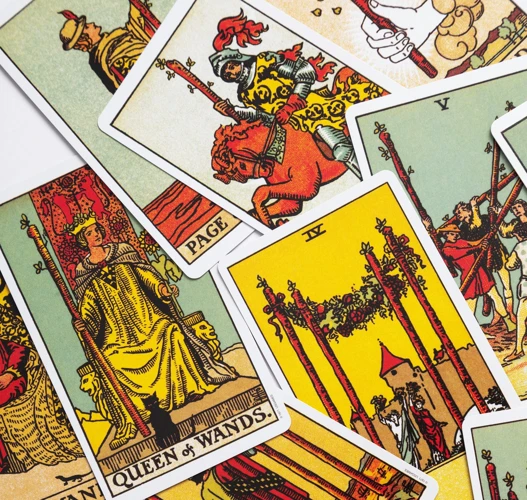
– One powerful way to connect with the energy of the Court Cards is through meditation and visualization. Take time to sit with each Court Card individually, allowing the imagery and symbolism to come to life in your mind. Visualize yourself stepping into the card, embodying the energy and essence of the character depicted. Through this practice, you can gain a deeper understanding of the qualities and energies associated with each Court Card.
– Journaling and reflection can also foster a strong connection with the Court Cards. Create a dedicated tarot journal where you can document your experiences, thoughts, and impressions of each Court Card. Write down your interpretations of the Court Cards, exploring their personality traits, symbolism, and any intuitive insights that arise. Regularly reflecting on these entries will help solidify your understanding of the Court Cards and strengthen your connection with their energy.
– Another way to connect with the Court Cards is by creating rituals and spells that specifically incorporate their energy. Based on the qualities and elements associated with each Court Card, design rituals that align with their symbolism. You can use corresponding crystals, colors, and herbs to enhance the ritual and amplify the desired energy. By intentionally working with the Court Cards in this manner, you can further develop a personal connection and attunement to their potent energy.
– It is important to remember that connecting with the Court Cards is a personal and intuitive process. Experiment with different techniques and find what resonates with you. Trust your instincts and allow yourself to explore and deepen your relationship with these powerful cards. As you continue to connect with the Court Cards, you will unlock their unique energy and gain valuable insights to enhance your tarot readings.
Meditation and Visualization
– Meditation and visualization are powerful techniques that can help you connect with the energy of the Court Cards on a deeper level.
– Find a quiet and peaceful space where you can relax and focus your mind.
– Choose a Court Card that you wish to connect with or gain insight from.
– Close your eyes and take a few deep breaths to center yourself.
– Visualize the Court Card vividly in your mind’s eye, bringing it to life with as much detail as possible.
– Imagine yourself entering the scene depicted on the card and interacting with the Court Card figure.
– Engage your senses and emotions as you explore the card, allowing yourself to fully immerse in its energy and symbolism.
– Pay attention to any messages, feelings, or insights that arise during this visualization process.
– Take your time to absorb and integrate the energies of the Court Card, allowing it to permeate your being.
– After the meditation, take a few moments to reflect on your experience and journal your thoughts and impressions (learn more about journaling and reflection).
– Regular practice of meditation and visualization with the Court Cards can deepen your understanding of their energy and enhance your ability to interpret them in readings.
Journaling and Reflection
Journaling and reflection can be powerful tools for connecting with the Court Cards on a deeper level. By recording your thoughts, impressions, and experiences with these cards, you can gain valuable insights and forge a stronger connection with their energies. Here are some tips for incorporating journaling and reflection into your tarot practice:
1. **Daily Card Journal**: Create a dedicated journal where you can record your daily card draws involving Court Cards. Write down the card you pulled, your initial impressions, and any intuitive messages that come to you. Reflect on how the card’s energy manifests in your day and any connections you notice with the people and situations around you.
2. **Question-Based Journaling**: Use journaling prompts to delve deeper into the Court Cards’ meanings. For example, you could ask yourself questions like “What does the Knight of Cups symbolize in my life right now?” or “How can I embody the qualities of the Queen of Pentacles?” Write down your thoughts, emotions, and any personal associations you have with the cards.
3. **Compare and Contrast**: Choose two Court Cards and compare them side by side. Explore their similarities and differences in terms of personality traits, elements, and symbolism. Reflect on how these cards complement or oppose each other’s energy and consider how they might apply to different aspects of your life.
4. **Dream Journaling**: Pay attention to any dreams or visions that feature Court Cards. Upon waking, jot down the details of your dream and reflect on the possible meanings and messages behind the appearance of these specific cards. Look for common themes or patterns that may emerge over time.
5. **Reflective Writing**: After conducting a tarot reading involving Court Cards, take some time to reflect on the experience. Write about your impressions during the reading, any insights gained, and how the Court Cards influenced your interpretation. Consider how your understanding of the cards has evolved and any personal growth that has resulted from your interactions with them.
Remember, there are no right or wrong ways to journal and reflect on the Court Cards. It’s a personal practice that allows you to deepen your connection with the cards and explore their meanings in your own unique way.
Creating Rituals and Spells
Creating rituals and spells involving the Court Cards can be a powerful way to connect with their energy and utilize their transformative potential. Here are some ideas on how to incorporate the Court Cards into your rituals and spells:
1. Card Altar: Create a sacred space dedicated to the Court Cards on your altar. Place each Court Card in its corresponding elemental direction (Earth in the North, Air in the East, Water in the West, Fire in the South). Use this space as a focal point during your rituals, allowing the energy of the Court Cards to guide and empower your spellwork.
2. Meditation: Choose a specific Court Card to meditate on, selecting one that aligns with your intention or the energy you wish to embody. Close your eyes, envision the Court Card, and allow its energy to envelop you. Visualize yourself embodying the qualities of the Court Card and channeling its strength and wisdom in your daily life and spellcasting.
3. Spellcasting: Incorporate specific Court Cards into your spellwork to enhance and amplify your intentions. For example, if you’re seeking inspiration and creative energy, include the Page of Wands in your spell. If you desire emotional healing, work with the Queen of Cups. Use the Court Cards as symbols and catalysts for manifestation, focusing on their unique qualities and energies to bring about your desired outcome.
4. Ritual Tools: Assign specific Court Cards to your ritual tools. For instance, you can designate the Queen of Pentacles to represent your cauldron, symbolizing abundance and grounding energy. The Knight of Swords can be associated with your athame, representing assertiveness and clear communication. By imbuing your ritual tools with these Court Card energies, you infuse your spells and rituals with their corresponding qualities.
5. Tarot Spread Ritual: Create a tarot spread specifically designed to connect with and receive guidance from the Court Cards. Craft questions that delve into the aspects represented by the Court Cards, such as personal growth, relationships, or career. Draw Court Cards for each position in the spread and interpret their meanings in relation to the inquiry. This ritual can deepen your understanding of the Court Cards and provide insightful guidance.
Remember, rituals and spells are personal and should be tailored to your unique intentions and spiritual practice. By incorporating the Court Cards, you tap into their archetypal energy and invite their transformative powers into your rituals, creating a profound connection with these cards and harnessing their energy for manifestation and personal growth.
Working with the Court Cards in Tarot Readings
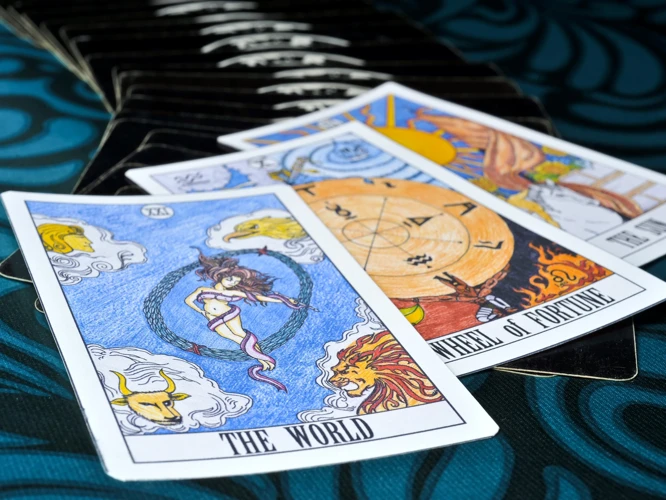
– When working with the Court Cards in tarot readings, it’s important to remember that they can represent both people and energies.
– One way to interpret Court Cards is by viewing them as actual individuals who may be present in a person’s life or influencing a particular situation.
– The Court Cards can indicate specific personalities, characteristics, or even specific individuals who may be involved in the querent’s life.
– For example, the Queen of Cups could represent a compassionate and intuitive individual, while the King of Swords might symbolize someone logical and analytical.
– On the other hand, Court Cards can also represent energies or qualities that are present in a situation or needed for its resolution.
– In this case, the Court Cards might indicate the need for assertiveness, compassion, or creativity, depending on their rank and element.
– The Court Cards can also be influenced by their position in a spread. For instance, a Court Card in the past position could suggest someone who has played a significant role in shaping the current situation.
– Similarly, a Court Card in the future position might signify a person or energy that will come into the querent’s life in the future.
– Integrating the Court Cards into tarot readings requires practice and intuition. As you become more familiar with the Court Cards and their nuances, you will develop a deeper understanding of how to interpret and apply them in different readings.
– By working with the Court Cards effectively, you can unlock their power and bring greater depth and clarity to your tarot readings.
Court Cards as People
Court Cards hold a special significance when it comes to representing people in tarot readings. Each Court Card can represent a specific individual or a personality archetype that is present in a particular situation. When interpreting Court Cards as people, it is important to consider their rank, element, and corresponding gender.
The Pages often represent youthful energy, curiosity, and potential. They can symbolize individuals who are eager to learn, explore, and embark on new adventures. Pages may also suggest the presence of messengers or bringers of news.
The Knights embody action, movement, and determination. They represent individuals who are driven, ambitious, and focused on achieving their goals. Knights can indicate a person who is brave, daring, and willing to take risks in order to accomplish their objectives.
Queens embody feminine energy and are associated with intuition, empathy, and nurturing qualities. They often represent individuals who are compassionate, caring, and emotionally perceptive. Queens may symbolize maternal figures or individuals who provide support and guidance.
Kings represent authority, leadership, and mastery. They embody masculine energy and often symbolize individuals who are confident, assertive, and assert their power and influence. Kings can represent mentors, role models, or individuals who hold positions of authority.
When interpreting Court Cards as people, it is crucial to consider their surrounding cards and the context of the reading. Court Cards can offer insights into the characteristics, behaviors, and motivations of the individuals they represent. They can also provide guidance on how to approach and interact with these individuals in different situations.
By developing a deeper understanding of Court Cards as people, tarot readers can unlock a powerful tool for gaining insights into the personalities and dynamics surrounding the querent. Utilizing these interpretations effectively can enhance the accuracy and depth of tarot readings, allowing for a more nuanced understanding of the people involved and the relationships at play.
Court Cards as Energies
The Court Cards in tarot can also be interpreted as energies rather than representing specific individuals. Each Court Card embodies a unique combination of qualities, characteristics, and archetypal energies that can be tapped into during a reading. These energies can reflect different aspects of ourselves or the people and situations we encounter. For example, the Knight of Cups represents emotional and creative energy, while the Queen of Swords embodies intellect and communication (check out our comprehensive Court Card tarot guide for more insights). By recognizing and working with these energies, tarot readers can gain a deeper understanding of the energetic forces at play in a given situation. The Court Cards can provide guidance on how to balance and utilize these energies effectively in order to navigate challenges or make the most of opportunities. Incorporating the Court Cards as energies in tarot readings adds another layer of interpretation, allowing for a more nuanced and profound exploration of the cards and their significance.
Position Meanings in Spreads
In tarot readings, spreads often have specific positions that represent different aspects or areas of a person’s life or situation. The Court Cards, when drawn in these positions, provide unique insights and meanings (learn more about interpreting Court Cards). Here are some common position meanings when working with the Court Cards in spreads:
1. Past: The Court Card in the past position can indicate an influential person or energy that has shaped the querent’s past experiences or set the foundation for the current situation. It may offer clues about past relationships, behaviors, or events that have led to the present circumstances.
2. Present: When the Court Card appears in the present position, it signifies the current influence or energy at play. It may represent a person who is currently affecting the querent’s life, or it could represent a particular trait or aspect that the querent should embody or pay attention to in their current situation.
3. Future: In the future position, the Court Card provides insights into potential outcomes or developments. It could indicate the arrival of a significant person, the need to adopt specific qualities, or the manifestation of certain energies in the future. It’s important to remember that the future is not set in stone, and the outcome can be influenced by the querent’s choices and actions.
4. Advice: The Court Card in this position offers guidance or advice on how to navigate the situation or make decisions. It may suggest embodying certain qualities, seeking the assistance of a particular person, or considering the perspective of a specific archetype. The Court Card’s message can provide clarity and direction when faced with choices or challenges.
5. Outcome: When the Court Card appears in the outcome position, it reveals the final result or resolution of the situation. It may signify the manifestation of a person or energy, the achievement of a particular state of being, or the impact of the Court Card’s qualities on the overall outcome. This position offers valuable insights into the long-term effects and consequences of the situation.
By understanding the position meanings when working with the Court Cards, tarot readers can provide comprehensive and insightful interpretations that accurately reflect the nuances and dynamics of the querent’s life or situation.
Combining Court Cards with Other Cards
When combining Court Cards with other cards in a tarot reading, a deeper layer of meaning and complexity can be revealed. Here are some ways to effectively incorporate Court Cards with other cards:
1. **Court Cards and Major Arcana**: The Major Arcana cards in tarot represent significant life events and powerful archetypal energies. When a Court Card appears alongside a Major Arcana card, it indicates that a person or specific energy is playing a significant role in the situation. Pay attention to the interactions and dynamics between these cards, as they can provide valuable insights into the influence of individual personalities or energies on the broader life themes and experiences.
2. **Court Cards and Minor Arcana**: The Minor Arcana cards represent everyday experiences and situations. When combined with Court Cards, they offer more specific context and details. For example, if a Page of Cups appears in a spread alongside the Three of Swords, it could signal a sensitive young person experiencing heartbreak or emotional pain. Look for patterns and connections between the Court Cards and the suits of the Minor Arcana to paint a comprehensive picture of the situation.
3. **Pairing Court Cards**: Another powerful technique is to pair Court Cards together. This can provide further insights into the dynamics and relationships between individuals. For instance, if the King of Swords and the Queen of Cups appear together, it could indicate a harmonious balance between intellect and emotions in a relationship or partnership. Pay attention to the gender, rank, and elemental correspondences, as they can offer clues about the dynamics between the paired Court Cards.
Combining Court Cards with other cards allows for a more nuanced and layered interpretation of a tarot reading. It unlocks deeper insights into the personalities, energies, and relationships at play, providing a more comprehensive understanding of the situation at hand. Experiment with these techniques and explore the intricacies of the Court Cards to elevate the depth and accuracy of your tarot readings.
Court Cards and Major Arcana
The Court Cards in tarot have a unique relationship with the Major Arcana. While the Major Arcana cards represent significant life events and spiritual lessons, the Court Cards bring the energy of people and personalities into the mix. When Court Cards and Major Arcana cards appear together in a reading, they can provide powerful insights into the individuals involved and the deeper meaning of the situation.
The Court Cards can amplify or modify the energy of the Major Arcana cards they are paired with. For example, if a Queen of Cups appears alongside The Empress card, it can indicate a nurturing and compassionate feminine presence in a spiritual or creative endeavor. On the other hand, if a King of Swords is seen alongside The Devil card, it can suggest a dominating and manipulative individual who is exerting control over a situation.
It is important to consider the interactions and dynamics between the Court Cards and the Major Arcana cards. For instance, a Page of Wands in juxtaposition with The Fool can signify an adventurous and enthusiastic young person who is embarking on a new journey. Conversely, a Knight of Pentacles alongside The Tower can suggest a sudden disruption or upheaval caused by someone who is grounded and practical in nature.
The Court Cards and Major Arcana cards bring depth and complexity to a reading, allowing for a more nuanced interpretation of the energies at play. By understanding the unique relationship between these two card groups, you can unlock a wealth of information and insight in your tarot readings. Experiment with different combinations and pay attention to the story that unfolds as you explore the interplay between the Court Cards and the Major Arcana cards.
Court Cards and Minor Arcana
When it comes to integrating the Court Cards with the Minor Arcana in tarot readings, there are several key considerations to keep in mind. Here are some insights and tips for working with the Court Cards alongside this subset of the tarot deck:
1. Connect the Court Cards to the Suit: Each Court Card belongs to a specific suit within the Minor Arcana: Wands, Cups, Swords, and Pentacles. Understanding the attributes and qualities associated with each suit can help you interpret the Court Cards within that context. For example, a Page of Cups embodies youthful emotions and creativity, while a King of Swords represents authority and intellectual prowess.
2. Pay Attention to Numerology: Consider the numerical value of the Court Cards in relation to the numbered cards within the same suit. For instance, a Knight of Pentacles (a Court Card) combined with the Four of Pentacles (a numbered card) suggests a focused and practical approach to financial matters.
3. Explore Symbolic Interactions: When Court Cards and numbered cards appear together in a reading, pay attention to how they interact or influence one another. The Court Cards can offer guidance on how the energy of the suit is being expressed by a particular individual or situation. For example, a Queen of Wands combined with the Ten of Swords may suggest that a passionate and charismatic individual is experiencing a difficult ending or transformation.
4. Consider Positions in the Spread: The position of a Court Card within a tarot spread can also influence its interpretation. For instance, if a Court Card appears in the past position, it may indicate a person or energy that has played a significant role in shaping the current situation. If it appears in the future position, it might suggest the involvement of a specific individual in upcoming events.
By observing the interplay between the Court Cards and the Minor Arcana, you can unravel deeper meanings within your tarot readings. Remember to trust your intuition and use the symbolism and energies of the cards to guide you in providing accurate and insightful interpretations.
Conclusion
– Unlocking the power of the Court Cards in tarot readings is a transformative journey that requires understanding, connection, and practice.
– By delving into the rich symbolism of the Court Cards, you can gain deeper insights into the personalities, energies, and dynamics at play in your life and readings.
– Recognizing the various personality traits associated with each Court Card allows you to interpret their presence in a reading accurately and provide meaningful guidance.
– Whether you use Court Cards as signifiers, tap into their energies during meditation and visualization, or incorporate them into rituals and spells, their power can be harnessed in powerful and profound ways.
– Understanding the relationships between Court Cards and how they interact with other cards in a spread empowers you to provide comprehensive and nuanced readings.
– Combining Court Cards with Major Arcana and Minor Arcana cards further amplifies their significance and adds depth to your interpretations.
– Through continuous exploration and practice, you can unlock the full potential of the Court Cards, elevating your tarot readings to new heights.
– So, embrace the enigmatic allure of the Court Cards, nurture your connection with their energy, and embark on a journey of unlocking their profound wisdom and guidance. Your tarot practice will be forever transformed.
Frequently Asked Questions
What do the Court Cards represent in tarot?
The Court Cards in tarot represent different personalities, archetypes, and energies that can manifest in our lives.
How many ranks are there in the Court Cards?
The Court Cards typically consist of four ranks: Pages, Knights, Queens, and Kings.
What do the different ranks of Court Cards correspond to?
The different ranks of Court Cards correspond to specific elements. Pages represent Earth, Knights represent Air, Queens represent Water, and Kings represent Fire.
Do the Court Cards reflect characteristics and behaviors of individuals?
Yes, the Court Cards can be seen as a reflection of ourselves and the people around us. They offer insights into their characteristics, behaviors, and motivations.
How can the Court Cards be used as signifiers in tarot readings?
The Court Cards can serve as signifiers, providing specific information about the individuals involved or the energy at play in a reading.
Are there specific personality traits associated with each Court Card?
Yes, each Court Card has its own set of personality traits. Understanding these traits can greatly enhance the accuracy of a tarot reading.
Can the Court Cards provide insights into relationships?
Absolutely! The Court Cards offer valuable insights into relationships and dynamics, shedding light on the connections and interactions between people.
Why is it important to study and explore the Court Cards?
Studying and exploring the Court Cards is essential for any tarot reader looking to unlock their full potential and effectively harness their energy.
How can understanding the Court Cards enhance tarot readings?
Understanding the Court Cards allows tarot readers to provide more accurate and meaningful interpretations, deepening the understanding of the individuals and situations in question.
What role do the Court Cards play in tarot readings?
The Court Cards can be used to represent both people and energetic influences in tarot readings, adding depth and nuance to the overall interpretation of the cards.
